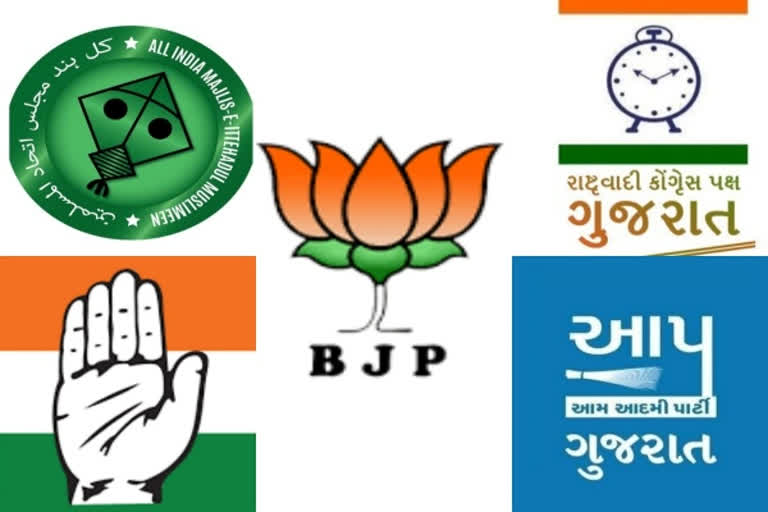Ahmedabad: When Gujarat is looking forward to the election results on February 23, speculations and calculations have become the order of the day. According to political analysts, two out of six municipal corporations – Rajkot and Surat – are likely to throw up surprising results, a big setback for the ruling BJP in Rajkot and Surat. However, political observers believe that BJP may scrape through with a paper-thin majority to claim the upper hand in the other four Municipal Corporations. It is also observed that many conventional party strongholds will be dented through cross-voting.
The growing influence of the Aam Aadmi Party among the immigrant labour population in the diamond city of Surat is considered a reason for the possible upset of BJP. Also, people's aversion towards political campaigning rooted in political issues of Nationalism and Hindutva, which had been the core of the political campaign for the party, dismissing the focus on local civic issues also would be working against the interest of the party among its neutral voters, it is observed.
Lower voter turnout is another major topic of discussion among all political parties. Every party is hoping that a lower voter percentage is going to work in their favour.
In Gujarat, urban voters seem to be less interested to come out and vote during Municipal Corporation elections. The voting percentage this time has come down to 45.64 percent from the 46.50 percentage in 2015. An innate apathy of the affluent class towards local politics and issues is what is impacting the voting percentage. In the 2010 elections, the voting percentage was even lower at 44.12 per cent.
When the lack of interest among the rich and powerful upper class in Gujarat is generally believed to be the reason for lower voter turnout, there are other political reasons also cited for disinterest among voters to exercise their franchise.
Has BJP's Three Rules resulted in lower voter interest?
BJP came up with three rules while allocating party tickets to contest the local body elections. Party denied tickets to those above 60 years of age, to those who have already contested three times in the past and to the kith and kin of party leaders. Party's attempts to field newer faces seemed to have backfired as the party senior leaders became inactive in poll campaigns. It is observed that the party's decision angered many in the party who refused to encourage supporters to go to the polling booths and to vote for the party.
Till the last elections in Gujarat people had just two options to choose from, BJP or Congress. But in the 2021 elections besides BJP and Congress, there were Aam Aadmi Party and Owaisi’s AIMIM also in the fray, changing the means of political equations in the State.
Also read: Gujarat Civic Polls: Voting in 6 municipal corporations concludes, counting on Feb 23
Also read: Low voter turnout in phase I Gujarat civic polls explained
This is expected to deny consolidation of votes for both BJP and Congress and divide their traditional vote banks. Muslim votes in Gujarat are going to be a major factor and we need to wait and see who they have favoured this time. There will be a division of votes among the four political parties. This time the Muslim votes tilted in whose favour? If Muslim votes have tilted in favour of AAP or AIMIM, Congress would be suffering more as Muslim votes remained with Congress till the last election. Owaisi's party understood it and had targeted Congress accusing them of doing nothing for Muslims during its election campaign in the state.
When Congress should be worried about the Muslim votes going to AIMIM, BJP is vary about the entry of AAP. Many who are unhappy with BJP have switched camps to AAP. The party had targeted both Congress and BJP, comparing them as one and alleging that Congress Manifesto is prepared at the BJP office. Arvind Kejriwal also had tweeted seeking Gujarat voters to give AAP a chance this time. The roadshow of AAP had also garnered huge support, forcing BJP to miss a few heartbeats.
The rich and affluent are staying out of the democratic process
Gujarat's rich and affluent are not interested to discuss the local issues or are never given an option of discussing them. Election campaigns were completely devoid of local civic issues that fall under the jurisdiction of Municipal Corporations. BJP talked about the party's development agenda at the state level along with Nationalism and Hindutva. Congress, as usual, failed to convey its promises effectively to the voters and Aam Aadmi is yet to be taken seriously as people are doubtful about the 'Guarantee Card' scheme of AAP, which is dubbed as 'Delhi's Free Model'.



